Fleurs du Mal Magazine


Or see the index
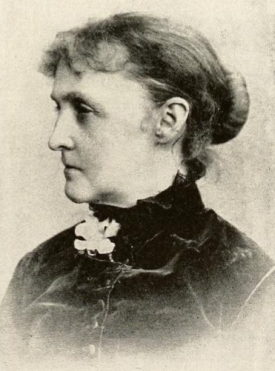
Hearing the Battle
July 21, 1861
One day in the dreamy summer,
On the Sabbath hills, from afar
We heard the solemn echoes
Of the first fierce words of war.
Ah, tell me, thou veilèd Watcher
Of the storm and the calm to come,
How long by the sun or shadow
Till these noises again are dumb.
And soon in a hush and glimmer
We thought of the dark, strange fight,
Whose close in a ghastly quiet
Lay dim in the beautiful night.
Then we talk’d of coldness and pallor,
And of things with blinded eyes
That stared at the golden stillness
Of the moon in those lighted skies;
And of souls, at morning wrestling
In the dust with passion and moan,
So far away at evening
In the silence of worlds unknown.
But a delicate wind beside us
Was rustling the dusky hours,
As it gather’d the dewy odors
Of the snowy jessamine-flowers.
And I gave you a spray of the blossoms,
And said: “I shall never know
How the hearts in the land are breaking,
My dearest, unless you go.”
Sarah Morgan Bryan Piatt
(1836–1919)
Hearing the Battle.
(July 21, 1861)
Poem
• fleursdumal.nl magazine
More in: # Classic Poetry Archive, #Editors Choice Archiv, *War Poetry Archive, Archive O-P, Archive O-P, WAR & PEACE
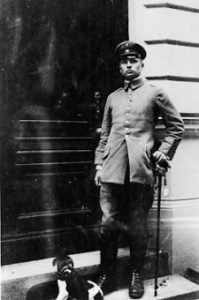
Der Dichter
Es neigte sich die Schar der jungen Knechte
Dem wirren Haar und dem zerschlißnen Rock.
Die Straße weiter taperte die Rechte,
Die Linke hielt sich krampfig fest am Stock.
Scham schlug ihm rot empor: er war betrunken
Und rang mit seinem Weg; und jäh erblaßt
War er im Rinnstein stolpernd hingesunken
Und raffte sich empor in wirrer Hast.
Da kam’s, daß er den Blick nach innen schlug,
Wo er, buntwechselnd wie Geleucht der Meere,
Wuchernder Blumen Fülle in sich trug.
Und atemraubend gab der süße, schwere
Duft seinem Sinn, der wie ein großer Falter
In ihre tiefen Rätselkelche sank,
Seltsamen Traum und schuf ihn zum Gestalter,
Der Lust und Qual in seine Lieder zwang.
So ging er, in sein Fühlen tief versunken,
Betäubt von Fiebern, Künder schwüler Nächte.
Man wich ihm schonend aus: er war betrunken.
Es neigte sich die Schar der jungen Knechte.
Hans Ehrenbaum-Degele
(1889 – 1915)
Der Dichter
Aus: Versensporn
•fleursdumal.nl magazine
More in: #Experimental Poetry Archive, *War Poetry Archive, - Archive Tombeau de la jeunesse, Archive E-F, Archive E-F, Expressionism, Expressionisme, Modernisme
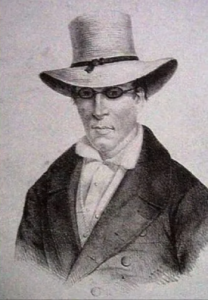
Le Mutilé
Vingt ans et mutilé !… voilà quelle est ma part;
Vingt ans… c’est l’âge où Dieu nous fait un cœur de flamme;
C’est l’âge où notre ciel s’embellit d’un regard,
L’âge où mourir n’est rien pour un baiser de femme.
Et le sort m’a tout pris !… excepté mon cœur!
Mon cœur… à quoi sert-il ? ironique faveur!
C’est le feu qui révèle au nautonier qui sombre,
Le gouffre inévitable au sein de la nuit sombre;
C’est la froide raison rendue à l’insensé:
Heureux s’il n’eût jamais pensé!
Mais ton amour est là, mon ange tutélaire,
Et mon cœur souffre moins, lorsque je dis: ma mère!
A ce large festin des élus d’ici-bas,
Qui me dira pourquoi je ne suis qu’un Lazare!
La vie est une fête où je ne m’assieds pas,
Et pourtant j’ai rêvé sa joyeuse fanfare!
La douleur m’a fait boire à sa coupe de fer;
Jeune vieillard, j’ai bu tout ce qu’elle a d’amer.
O vous qui demandez si l’âme est immortelle,
Et ma part de bonheur,… dites!… où donc est-elle?
Quoi ! Dieu nous mentirait, quand sa sainte équité
Nous promet l’immortalité!
Mais ton amour est là, mon ange tutélaire,
Et je ne puis douter, lorsque je dis: ma mère!
Toute existence ici s’échange par moitié,
Chaque âme peut trouver cette âme de son rêve;
Moi, quand je crie : Amour, l’écho répond : Pitié !…
Et ce mot dans mon cœur s’enfonce comme un glaive
Quelle bouche de femme éteindra dans mon sein
Cette soif d’être aimé qui me brûle sans fin?
Vivre seul dans la vie… Oh ! ce penser me tue!
Vivre seul… quand mon cœur est si riche d’amour.
Il vibre comme un glas dans mon âme abattue;
C’est à ne plus aimer le jour!
Mais ton amour est là, mon ange tutélaire,
Et je veux vivre encor, lorsque je dis: ma mère!
Souvent, le front ridé de mes sombres ennuis,
J’ai voulu, dans la foule, être oublieux et vivre;
J’ai voulu respirer, au sein des folles nuits,
Ces voluptés de bal dont le prestige enivre;
Imprudent que j’étais!… j’ai maudit leurs plaisirs!
Car je voyais glisser, dans leur valse en délire,
Ces vierges que le ciel enfanta d’un sourire;
Je les voyais; et nulle, en passant près de moi,
Ne disait d’un regard : à toi!
Mais ton amour est là, mon ange tutélaire,
Et je ne maudis plus, lorsque je dis: ma mère
Oh ! vous ne savez pas, vous qui vivez heureux,
Ce qu’un long désespoir peut jeter dans la vie!
Vous n’avez point senti ce moxa douloureux
Qui torture le cœur et qu’on nomme l’envie!
Quand un rêve d’amour vous suit au bal bruyant,
L’espérance du moins s’y montre en souriant;
Mais moi, lorsque le bal a fini ses quadrilles,
Ai-je une fiancée, entre ces jeunes filles,
A qui je puisse dire en lui serrant la main:
Dieu m’a fait un bien doux destin!
Mais ton amour est là, mon ange tutélaire,
Et puis-je être envieux, lorsque je dis : ma mère!
Ah ! lorsque vers la tombe inclinera mon front,
Je n’aurai pas une âme à qui léguer mon âme;
Arrivé seul au port où m’attend l’abandon,
Sans sourire, sans pleurs, je quitterai la rame.
Aucun enfant au seuil de mes jours éternels
Ne viendra recevoir mes adieux paternels!
Autour de mon chevet, à l’heure d’agonie,
Mes regards vainement chercheront une amie!
Et de moi, sur ce globe où je vins pour souffrir,
Plus rien… pas même un souvenir!
Mais ton amour est là, mon ange tutélaire,
Et si tu me survis, tu pleureras…. ma mère!
Eugène Dayot
(1810-1852)
Le Mutilé
• fleursdumal.nl magazine
More in: Archive C-D, Archive C-D, Dayot, Eugène, Leprosy

An Irish Airman foresees his Death
I know that I shall meet my fate
Somewhere among the clouds above;
Those that I fight I do not hate,
Those that I guard I do not love;
My country is Kiltartan Cross,
My countrymen Kiltartan’s poor,
No likely end could bring them loss
Or leave them happier than before.
Nor law, nor duty bade me fight,
Nor public men, nor cheering crowds,
A lonely impulse of delight
Drove to this tumult in the clouds;
I balanced all, brought all to mind,
The years to come seemed waste of breath,
A waste of breath the years behind
In balance with this life, this death.
William Butler Yeats
(1865-1939)
An Irish Airman foresees his Death
Photo: Alice Boughton, 1903
• fleursdumal.nl magazine
More in: Archive Y-Z, Archive Y-Z, Yeats, William Butler
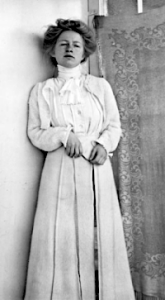
En önskan
Av hela vår soliga värld
önskar jag blott en trädgårdssoffa
där en katt solar sig…
Där skulle jag sitta
med ett brev i barmen,
ett enda litet brev.
Så ser min dröm ut…
Edith Södergran
(1892-1923)
En önskan
• fleursdumal.nl magazine
More in: Archive S-T, Archive S-T, Södergran, Edith
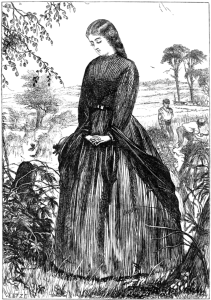
“Alone—together”
I
Alone, I see the sunrise, from the rocks above the sea;
And the hamlet flushed with rosy light, seems fairy-land to me:
There dwells the pilot’s daughter, whose dear love I’d die to win;
And the blue sky fills my heart with hope, while the merry tide flows in.
II
’Tis noon—we stand together, on the sands beside the sea;
And the maiden, folded to my heart, is sworn my bride to be!
In the sunshine flash the sea-gulls, skimming waves of rippled light;
The fisher boats ride gaily, under cliffs of dazzling white.
III
Alone, I see the sunset, from the churchyard near the sea,
For the cruel grave-stone at my feet, hides my darling’s face from me!
Like some dark pall, the sea-weeds droop from ledges cold and grey;
The night-mists shroud the hamlet, and the tide ebbs fast away!
Evelyn Forest
(Pen name of Anne Pares)
(? – ?)
“Alone—together”
Illustration: Frederick Eltze (1836–1870)
• fleursdumal.nl magazine
More in: # Classic Poetry Archive, Archive E-F, Archive E-F, Archive O-P, Archive O-P
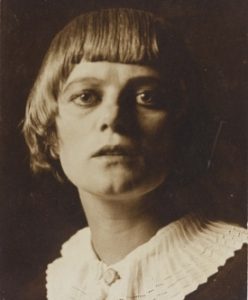
Tänzerin
Dir ist als ob ich schon gezeichnet wäre
Und auf der Totenliste stünde.
Es hält mich ab von mancher Sünde.
Wie langsam ich am Leben zehre.
Und ängstlich sind oft meine Schritte,
Mein Herz hat einen kranken Schlag
Und schwächer wird’s mit jedem Tag.
Ein Todesengel steht in meines Zimmers Mitte.
Doch tanz ich bis zur Atemnot.
Bald werde ich im Grabe liegen
Und niemand wird sich an mich schmiegen.
Ach, küssen will ich bis zum Tod.
Emmy Hennings
(1885 – 1948)
Tänzerin
• fleursdumal.nl magazine
More in: Archive G-H, Archive G-H, Emmy Hennings, Hennings, Emmy, Performing arts
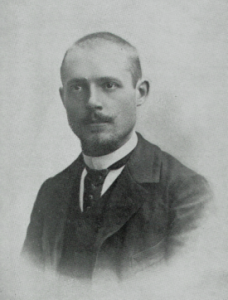
Paradis est plus fleuri que printemps.
Paradis est plus moissonneux qu’été.
Paradis est plus vendangeux qu’automne.
Paradis est si éternel qu’hiver.
Paradis est plus soleilleux que jour.
Paradis est plus étoilé que nuit.
Paradis est plus ferme que le ferme décembre.
Paradis est plus doux que le doux mois de mai.
Paradis est plus secret que jardin fermé.
Paradis est plus ouvert que champ de bataille.
Paradis est plus vieux que saint Jérôme.
Paradis est le céleste pourpris.
Paradis est plus capital que Rome.
Paradis est plus peuplé que Paris.
Paradis est désert plus que plaine en décembre.
Paradis est public et qui veut vient y boire.
Paradis est plus frais que l’aube fraîche.
Paradis est plus ardent que midi.
Paradis est plus calme que le soir.
Paradis est si éternel que Dieu.
Paradis est sanglant plus que champ de bataille.
Paradis est sanglant du sang de Jésus-Christ.
Paradis est royaume des royaumes.
Paradis est le dernier reposoir.
Paradis est le siège de Justice.
Paradis est le royaume de Gloire.
Paradis est plus beau qu’un jardin de pommiers.
Paradis est plus floconneux qu’hiver.
Paradis est plus sévère que mars.
Paradis est plus boutonneux qu’avril.
Paradis est plus bourgeonneux qu’avril.
Paradis est plus cotonneux qu’avril.
Paradis est plus embaumé que mai.
Paradis est plus accueillant qu’auberge.
Paradis est plus fermé que prison.
Paradis est demeure de la Vierge.
Paradis est la dernière maison.
Paradis est le Trône de Justice.
Veuille seulement Dieu que route y aboutisse.
Route que cheminons depuis dix-huit cents ans.
Paradis est auberge à la très belle enseigne.
Car c’est l’enseigne-ci : à la Croix de Jésus.
Cette enseigne éternelle est pendue à la porte.
Charles Péguy
(1873 - 1914)
Le Mystère des Saints-Innocents
(1912)
• fleursdumal.nl magazine
More in: # Classic Poetry Archive, Archive O-P, Archive O-P, Peguy, Charles, WAR & PEACE

The Lake Isle of Innisfree
I will arise and go now, and go to Innisfree,
And a small cabin build there, of clay and wattles made;
Nine bean-rows will I have there, a hive for the honey-bee,
And live alone in the bee-loud glade.
And I shall have some peace there, for peace comes dropping slow,
Dropping from the veils of the morning to where the cricket sings;
There midnight’s all a glimmer, and noon a purple glow,
And evening full of the linnet’s wings.
I will arise and go now, for always night and day
I hear lake water lapping with low sounds by the shore;
While I stand on the roadway, or on the pavements grey,
I hear it in the deep heart’s core.
William Butler Yeats
(1865-1939)
The Lake Isle of Innisfree
Photo: Alice Boughton, 1903
• fleursdumal.nl magazine
More in: Archive Y-Z, Archive Y-Z, Yeats, William Butler
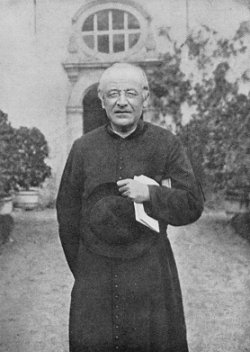
O! ‘t ruisen van het ranke riet
O! ‘t ruisen van het ranke riet!
o wist ik toch uw droevig lied!
wanneer de wind voorbij u voert
en buigend uwe halmen roert,
gij buigt, ootmoedig nijgend, neer,
staat op en buigt ootmoedig weer,
en zingt al buigen ‘t droevig lied,
dat ik beminne, o ranke riet!
O! ‘t ruisen van het ranke riet!
hoe dikwijls zat ik niet
nabij den stillen waterboord,
alleen en van geen mens gestoord,
en lonkte ‘t rimpelend water na,
en sloeg uw zwakke stafjes ga,
en luisterde op het lieve lied,
dat gijmij zongt, o ruisend riet!
O! ‘t ruisen van het ranke riet!
hoe menig mens aanschouwt u niet
en hoort uw’ zingend’ harmonij,
doch luistert nit en gaat voorbij!
voorbij alwaar hem ‘t herte jaagt,
voorbij waar klinkend goud hem plaagt;
maar uw geluid verstaat hij niet,
o mijn beminde ruisend riet!
Nochtans, o ruisend ranke riet,
uw stem is zo verachtelijk niet!
God schiep den stroom, God schiep uw stam,
God zeide: “Waait!…” en ‘t windtje kwam,
en ‘t windje woei, e, wabberde om
uw stam, die op en neder klom!
God luisterde… en uw droevig lied
behaagde God, o ruisend riet!
O neen toch, ranke ruisend riet,
mijn ziel misacht uw tale niet;
mijn ziel, die van den zelven God
‘t gevoel ontving, op zijn gebod,
‘t gevoel, dat uw geruis verstaat,
wanneer gij op en neder gaat:
o neen, o neen toch, ranke riet,
mijn ziel misacht uw tale niet!
O! ‘t ruisen van het ranke riet
weergalleme in mijn droevig lied,
en klagend kome ‘t voor uw voet,
Gij, die ons beiden leven doet!
o Gij, die zelf de kranke taal
bemint van enen rieten staal,
verwerp toch ook mijn klachte niet:
ik! arme, kranke, klagend riet!
Guido Gezelle
(1830 – 1899)
O! ‘t ruisen van het ranke riet
Uit: Vlaemsche dichtoefeningen 1857
• fleursdumal.nl magazine
More in: Archive G-H, Archive G-H, Gezelle, Guido, Guido Gezelle
Raymond Carvers wereldfaam berust op tweeënzeventig korte verhalen waarin zelden iets bijzonders gebeurt.
Carver beschrijft de gewone wederwaardigheden van gewone mensen in gewoon proza. Zijn grote talent is het naar boven brengen van het bijzondere, het beangstigende en het dramatische in al die gewoonheid.

In zijn eigen woorden: ‘Het is mogelijk om in een gedicht of verhaal over alledaagse dingen en voorwerpen te schrijven in alledaagse maar dan wel precieze taal en die dingen – een stoel, het gordijn voor een raam, een vork, een steen, de oorbel van een vrouw – een immense, zelfs aangrijpende lading mee te geven.’
De verhalen van Carver vormen het schoolvoorbeeld van het korte verhaal als een slice of life: er is weinig plot, weinig expliciete voorgeschiedenis; hoe het afloopt krijg je ook nooit te lezen, maar de kennismaking met een volstrekt authentiek, onbekend leven, dat in zijn beperktheid toch een volledig beeld geeft, brandt de lezer in de ziel.
Carver-vertaler Sjaak Commandeur selecteerde speciaal voor deze uitgave 200 pagina’s nooit eerder vertaald werk. Een kleine weldaad is de grootste verzameling van Carvers werk die ooit in Nederland verscheen, met onder veel meer de klassiekers Wees alsjeblieft stil, alsjeblieft, Waar we over praten als we over liefde praten en Kathedraal.
Raymond Carver (1938–1988) brak in 1976 door met de publicatie van zijn verhaal ‘Will You Please Be Quiet, Please?’ en de gelijknamige bundel. Later volgden de verhalenbundels What We Talk About When We Talk About Love (1981) en Cathedral (1983). Carver groeide op in een gezin uit de lagere middenklasse. De uitdagingen en moeilijkheden die hij in die sociale klasse observeerde, vormen een centraal thema in zijn gehele oeuvre, evenals zijn eigen worstelingen in zijn huwelijk en met een alcoholverslaving. Carver is een van de meest karakteristieke stemmen uit de twintigste-eeuwse Amerikaanse literatuur.
Auteur: Raymond Carver
Een kleine weldaad.
Alle Verhalen
Vertaler: Sjaak Commandeur
Taal: Nederlands
Releasedatum: 01 september 2023
Bindwijze: Gebonden
ISBN 9789028232075
812 pagina’s
Prijs: € 45,00
• fleursdumal.nl magazine
More in: - Book News, - Bookstores, Archive C-D, Archive C-D, Carver, Raymond
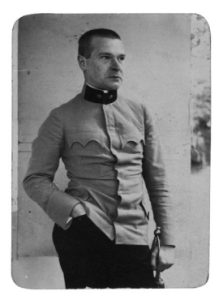
Abendländisches Lied
O der Seele nächtlicher Flügelschlag:
Hirten gingen wir einst an dämmernden Wäldern hin
Und es folgte das rote Wild, die grüne Blume und der lallende Quell
Demutsvoll. O, der uralte Ton des Heimchens,
Blut blühend am Opferstein
Und der Schrei des einsamen Vogels über der grünen Stille des Teichs.
O, ihr Kreuzzüge und glühenden Martern
Des Fleisches, Fallen purpurner Früchte
Im Abendgarten, wo vor Zeiten die frommen Jünger gegangen,
Kriegsleute nun, erwachend aus Wunden und Sternenträumen.
O, das sanfte Zyanenbündel der Nacht.
O, ihr Zeiten der Stille und goldener Herbste,
Da wir friedliche Mönche die purpurne Traube gekeltert;
Und rings erglänzten Hügel und Wald.
O, ihr Jagden und Schlösser; Ruh des Abends,
Da in seiner Kammer der Mensch Gerechtes sann,
In stummem Gebet um Gottes lebendiges Haupt rang.
O, die bittere Stunde des Untergangs,
Da wir ein steinernes Antlitz in schwarzen Wassern beschaun.
Aber strahlend heben die silbernen Lider die Liebenden:
Ein Geschlecht. Weihrauch strömt von rosigen Kissen
Und der süße Gesang der Auferstandenen.
Georg Trakl
(1887 – 1914)
Abendländisches Lied
• fleursdumal.nl magazine
More in: Archive S-T, Archive S-T, Trakl, Georg, Trakl, Georg
Thank you for reading Fleurs du Mal - magazine for art & literature